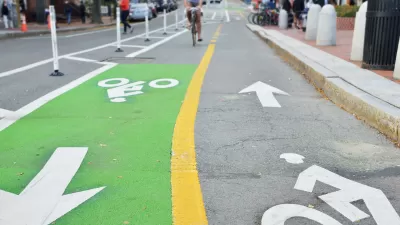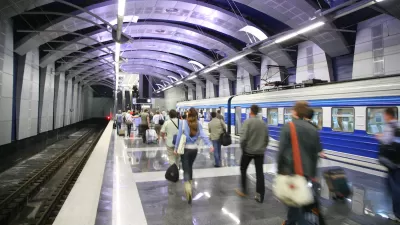This week, I came to the Planetizen office to find that I had received a package in the mail containing a matching set of men's and women's athletic socks. After opening the box, I learned that these were not ordinary socks – which are manufactured from petroleum derived synthetic fibers – but from a new type of fiber made from corn (which, along with soybeans and bamboo, seems set to become one of the most versatile substances of the 21st century). I'm not really sure why I someone thought I should receive a few pairs of corn-fiber socks (perhaps they knew I'd blog about it), but it did seem to me to be another symbol of how the world is slowly but steadily entering a bold, new, eco-friendly future.
This week, I came to the Planetizen office to find that I had received a package in the mail containing a matching set of men's and women's athletic socks. After opening the box, I learned that these were not ordinary socks – which are manufactured from petroleum derived synthetic fibers – but from a new type of fiber made from corn (which, along with soybeans and bamboo, seems set to become one of the most versatile substances of the 21st century). I'm not really sure why I someone thought I should receive a few pairs of corn-fiber socks (perhaps they knew I'd blog about it), but it did seem to me to be another symbol of how the world is slowly but steadily entering a bold, new, eco-friendly future.
There's obviously lots of interest in the green revolution within the urban planning community, dovetailing with the current focus on sustainable urban development (aka smart growth). Yet, I sometimes wonder if they are necessarily moving cities towards the same goal.
One of the primary arguments against auto-oriented urban development (aka sprawl) is its negative effect on the environment -- particularly air quality. The logic now goes that sprawl forces people to drive cars, cars that burn gasoline and emit pollution, which fouls our air, and causes asthma, cancer and a host of other problems for living creatures on the planet (including global warming). This argument has been important for enlisting the support of environmentalists and public health officials in advocating for more compact, pedestrian and transit-oriented neighborhoods.
But what happens if (or when) technology finally delivers a car that emits little or no pollution? Is the case for compact urban growth compromised? If driving ceases to be an environmental sin, should 'smart' growth seek to discourage it?
Electric, hybrid, and fuel cell cars always seem to get a good deal of attention in the media -- and presumably it's because many people can't wait for the day when they can drive to the heart's content with a clear conscious that they aren't contributing to armed conflict in the Middle East or rising sea levels. Sure, there might still be traffic, but if my vehicle runs on solar power while idling, well then I'm just wasting my own time (which is mine to waste if I choose).
This thinking also goes beyond cars -- if homes and offices are built more energy-efficient and with greater sensitivity to the environment (as seems to be the trend), does it matter if they are in Midtown Manhattan or rural Montana?
Clearly, these are big 'ifs', and it remains to be seen what advances will come (and if the political will and consumer demand will exist to allow them to flourish).
But it's interesting (for me, anyhow) to wonder whether the definition of smart growth might be altered in the future to accommodate the fact that low-density, auto-oriented development might one day be as ecologically friendly as the compact, dense, walkable communities that many in the planning community (including myself) hold up as a model of sustainable human settlement.
Until then, I'll just marvel at the modern miracle that is the corn-fiber athletic sock.

Planetizen Federal Action Tracker
A weekly monitor of how Trump’s orders and actions are impacting planners and planning in America.

Maui's Vacation Rental Debate Turns Ugly
Verbal attacks, misinformation campaigns and fistfights plague a high-stakes debate to convert thousands of vacation rentals into long-term housing.

San Francisco Suspends Traffic Calming Amidst Record Deaths
Citing “a challenging fiscal landscape,” the city will cease the program on the heels of 42 traffic deaths, including 24 pedestrians.

Amtrak Rolls Out New Orleans to Alabama “Mardi Gras” Train
The new service will operate morning and evening departures between Mobile and New Orleans.

The Subversive Car-Free Guide to Trump's Great American Road Trip
Car-free ways to access Chicagoland’s best tourist attractions.

San Antonio and Austin are Fusing Into one Massive Megaregion
The region spanning the two central Texas cities is growing fast, posing challenges for local infrastructure and water supplies.
Urban Design for Planners 1: Software Tools
This six-course series explores essential urban design concepts using open source software and equips planners with the tools they need to participate fully in the urban design process.
Planning for Universal Design
Learn the tools for implementing Universal Design in planning regulations.
Heyer Gruel & Associates PA
JM Goldson LLC
Custer County Colorado
City of Camden Redevelopment Agency
City of Astoria
Transportation Research & Education Center (TREC) at Portland State University
Jefferson Parish Government
Camden Redevelopment Agency
City of Claremont






























